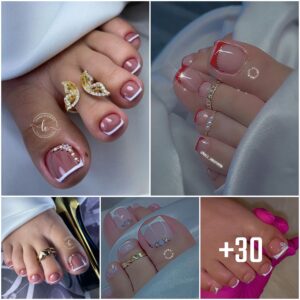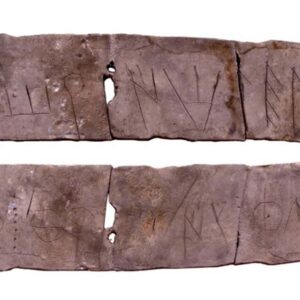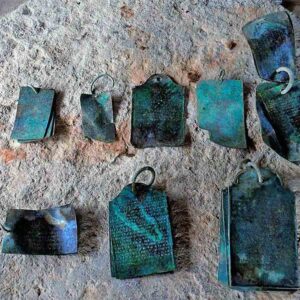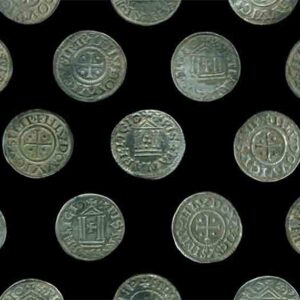Up to date
30 Could, 2023 – 18:31
Sahir
Beautiful Silver Bracelet of Egyptian Queen Hetepheres Reveals Commerce Secrets and techniques
- Learn Later
In a outstanding revelation from a latest examine, historical Egypt has as soon as once more defied expectations, showcasing its globalized nature even within the early Bronze Age. The examine, centered round a fascinating silver bracelet adorning the wrist of Queen Hetepheres I from the Fourth Dynasty, has unveiled a commerce community between historical Egyptians and Greeks courting again to 2600 BC. These findings problem earlier assumptions, shedding gentle on an intensive and longstanding commerce relationship that prolonged past Egypt’s borders. From the enchanting Cycladic Islands to bustling Lavron in Greece, the discoveries paint a vivid image of a world interconnected via commerce and treasure.
- Echoes of Everlasting Egyptian Artwork: Masters of Kind and Finesse
- Treasure Chest Present in Egypt Reveals Clues to Thutmose II’s Misplaced Tomb
A Lengthy Interconnectedness: Commerce and Treasure
The examine revealed within the famed Journal of Archaeological Science, analyzed the silver artifacts from Historic Egypt, unveiling a commerce community with the Historic Greeks that was not solely extra in depth, but in addition considerably older than beforehand believed. It seems that the Historic Egyptians have been actively engaged in a flourishing commerce community that prolonged far past their borders.
The commerce routes spanned throughout the Bronze Age Cycladic Islands, the Hellenic cities nestled in Anatolia (present-day Turkey), the enchanting isle of Crete, and the bustling Lavrion on mainland Greece.
“Egypt has no home silver ore sources and silver is never discovered within the Egyptian archaeological report till the Center Bronze Age,” write the authors, a crew of archaeologists from Australia, France, and the USA. “Surprisingly, the lead isotope ratios are in keeping with ores from the Cyclades (Aegean islands, Greece), and to a lesser extent from Lavrion (Attica, Greece), and never partitioned from gold or electrum as beforehand surmised. Sources in Anatolia (Western Asia) may be excluded with a excessive diploma of confidence,” write the report authors.

(A) Bracelets within the burial chamber of Tomb G 7000X as found by George Reisner in 1925 (Photographer: Mustapha Abu el-Hamd, August 25 1926) (B) Bracelets in restored body, Cairo JE 53271–3 (Photographer: Mohammedani Ibrahim, August 11 1929) (C) A bracelet (proper) within the Museum of Superb Arts, Boston, MFA 47.1700. The bracelet on the left is an electrotype copy made in 1947, MFA 52.1837 (Harvard College—Boston Museum of Superb Arts Expedition; All Pictures © April 2023 Museum of Superb Arts, Boston).
These gorgeous silver artifacts had languished with out thorough evaluation for a number of many years till now. The lead creator of the report, Karin Sowada from the esteemed Division of Historical past and Archaeology at Macquarie College in Sydney, has spearheaded this groundbreaking analysis and report.
“This type of historical buying and selling community helps us to grasp the beginnings of the globalized world,” Dr Sowada instructed the ABC. “For me that’s a really surprising discovering on this specific discovery. Egypt was identified for its gold, however had no native sources of silver. This era of early Egypt is a little bit bit terra incognita from the angle of silver,” Dr Sowada continued. She added that the bracelets represented “primarily the one large-scale silver that exists for this era of the third millennium BC”.
- 25 Unbelievable Treasures from the Tomb of Tutankhamun You Could Not Have Seen
- Tutankhamun Used Condoms Comprised of Oil-Soaked Linen
Queen Hetepheres: The Daughter of God – A Hidden Thriller
Queen Hetepheres, often known as the ‘Daughter of God,’ held a major place because the direct royal bloodline of the Fourth Dynasty in Egypt, in the course of the esteemed Previous Kingdom interval spanning from 2700 BC to 2200 BC. She was married to King Sneferu and gave delivery to a son and successor, Khufu, who commissioned a grand tomb and pyramid for her everlasting resting place.
For hundreds of years, the whereabouts of Queen Hetepheres’ burial website remained shrouded in thriller till a fortuitous discovery in 1925. Explorers stumbled upon a beforehand hidden shaft in Giza, the place they uncovered her empty sarcophagus. Whereas it was initially presumed that Hetepheres had been laid to relaxation close to her husband’s pyramid in Dahshur, her son, Khufu, ordered her tomb to be relocated to Giza after it was focused by tomb robbers.
The exact location of Queen Hetepheres’ physique and the opposite valuable artifacts buried together with her stay unknown. Dr. Sowada emphasised that “these objects themselves give us a window into her life and the way she lived.”
Analysis and Evaluation: A Superb Science
To delve into the secrets and techniques held by these historical artifacts, the report authors meticulously examined samples from the gathering housed within the famend Museum of Superb Arts in Boston. Using cutting-edge methods corresponding to bulk XRF, micro-XRF, SEM-EDS, X-ray diffractometry, and MC-ICP-MS, they efficiently uncovered important elemental and mineralogical compositions. Moreover, the crew utilized lead isotope ratios to achieve invaluable insights into the character, metallurgical remedy, and attainable ore supply of the silver.
To their astonishment, the analyses unveiled the presence of silver, silver chloride, and even a attainable hint of copper chloride inside the minerals. Nevertheless, it was the lead isotope ratios that blew their thoughts. The ratios corresponded completely to these present in silver originating from the Aegean, Attica, and Anatolia—areas that flourished in the course of the Bronze Age, predating the Hellenistic interval.

Hetepheres I bracelets. Elements of two silver bracelet (roughly one-third preserved) with elements of two butterflies inlaid in turquoise, lapis lazuli, and carnelian (©Harvard University—Boston Museum of Fine Arts Expedition)
Additional examination of a cross-section of a bracelet fragment owned by Queen Hetepheres offered fascinating particulars in regards to the craftsmanship concerned in creating these historical treasures. It turned obvious that the metallic had undergone repeated annealing and chilly hammering in the course of the intricate crafting course of, reveals ABC.
Maybe essentially the most important discovering to emerge from this examine is the conclusive proof that Egypt and Greece have been concerned in long-distance commerce a lot sooner than beforehand identified. In reality, this analysis offers the primary scientific substantiation that silver was sourced from the Aegean Islands in Greece, unveiling a beforehand unknown facet of their historical commerce networks.
Whereas details about Egypt’s commerce networks turned extra documented in the course of the Center Kingdom (2040 BC – 1782 BC) and the New Kingdom (1550 BC – 1069 BC), the appliance of lead isotope evaluation to silver objects from the Center Kingdom is the best takeaway from this examine.
“Within the Center Kingdom and the New Kingdom a lot, a lot later, we now have a lot of papyrus that include administrative information, commerce information and so forth,” Dr Gillan Davis from the Australian Catholic College, one of many authors, instructed the ABC. “However for the Previous Kingdom, it’s simply too way back, these paperwork for essentially the most half haven’t survived,” she concluded.
Prime picture: Backside, a Hetepheres bracelet within the Museum of Superb Arts, Boston, MFA 47.1700. Prime, an electrotype copy made in 1947, MFA 52.1837 (Harvard College—Boston Museum of Superb Arts Expedition) Supply: © April 2023 Museum of Superb Arts, Boston/ Journal of Archaeological Science
By Sahir Pandey
References
Judd, B. 2023. Silver in historical Egyptian bracelets offers earliest proof for long-distance commerce between Egypt and Greece. Accessible at: https://www.abc.net.au/news/science/2023-05-30/researchers-analyse-queen-hetepheres-tomb-bracelets/102376846.
Kosmos, N. 2023. New proof reveals Historic Egyptian and Greek commerce prolonged to the Bronze Age. Accessible at: https://neoskosmos.com/en/2023/05/30/features/new-evidence-reveals-ancient-egyptian-and-greek-trade-extended-to-the-bronze-age/.
Sowada, Okay., et al. 2023. Analyses of queen Hetepheres’ bracelets from her celebrated tomb in Giza reveals new info on silver, metallurgy and commerce in Previous Kingdom Egypt, c. 2600 BC. Accessible at: https://doi.org/10.1016/j.jasrep.2023.103978.





